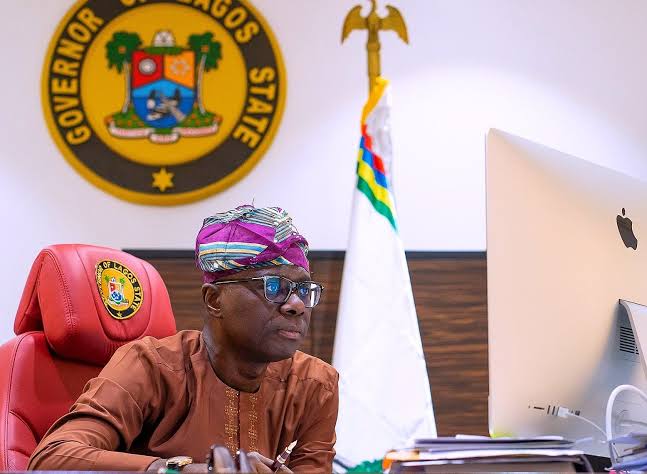By Funke Cole

In a bustling city like Lagos, Nigeria’s Centre of Excellence, it is not surprising that traffic gridlocks and congestion are daily occurrences. But ever-forward looking, the state government has continued to rise above the shenanigans of some recalcitrant motorists and road users who have formed the habit of committing all manner of excesses.
All thanks to the Lagos State Traffic Management Authority (LASTMA), created by the then Governor Bola Tinubu about 25 years ago, the hitherto chaotic Lagos traffic has been brought to its barest minimum. Ever since, subsequent administrations have not rested on their laurels as they continuously fine-tune, rejig, review and restructure the state traffic management apparatus.
Perhaps this is what informed the installation of a Permanent Secretary (Office of Infrastructure, Engr. Lateef Somide as Special Traffic Mayor by LASTMA, where Somide described his induction as a welcome development to improve vehicular movement and traffic management in the state. The agency’s Director of Traffic Advocacy and Special Traffic Mayor, Mr. Jimi Awoyemi, who inducted and decorated the Permanent Secretary, urged the new Traffic Mayor to assist in promoting and delivering on good traffic flow in the State.
Also, the state government is set to impose stiffer penalties for traffic violations with the review of fines payable by traffic offenders, according to the Attorney-General and Commissioner for Justice, Mr. Lawal Pedro (SAN). This will not only tackle traffic violations but also street trading. The government has therefore launched a statewide sensitisation campaign to educate residents on the need to comply with traffic and environmental laws.
During a one-day sensitisation campaign, organised by the state Special Offences (Mobile) Court, in collaboration with state Task Force recently at Bolade, Oshodi, Pedro said: ‘This sensitisation programme aligns with the T.H.E.M.E.S+ Agenda of the current administration, reinforcing its commitment to delivering on the promises of enhanced security, public safety, and effective transportation and traffic management’.
Notorious habits such as driving in a direction prohibited by law (better known as one-way), plying the designated BRT corridor, obstruction of vehicular movement on the highway and street trading, will no longer be tolerated. The senior lawyer reiterated that ‘ignorance of the law is no excuse. Many people are unaware that acts like crossing major roads where pedestrian bridges are provided, or trading in the middle of the road, are punishable offences. The mobile court is here to ensure swift justice for such infractions without overburdening regular courts’.
Pedro acknowledged the state’s population density and infrastructural challenges but assured the public that the government is working to address these issues. Public conveniences are being constructed in high-density areas, and more facilities are planned to prevent open defecation and promote hygiene.
The Solicitor-General and Permanent Secretary of the Ministry of Justice, represented by a Director in Civil Litigation, Mrs. Yemisi Ogunlola described the campaign as a clarion call for citizens to fulfill their civic responsibilities. ‘The laws are clear, but compliance remains a challenge. This campaign is a reminder that while the government provides facilities like public toilets, it is the responsibility of citizens to use them appropriately’, she said.
The government reiterated its commitment to addressing infrastructural gaps, particularly in high-density areas, with plans to construct more public facilities. Officials also encouraged residents to report offenders to the relevant authorities, stressing that adherence to the law is key to fostering a safer and more organised Lagos.
As part of the campaign, taskforce members and mobile court officials took to the streets in a show of solidarity, donning branded shirts and caps as they engaged with the public. The campaign is set to be a continuous exercise, reflecting the state’s determination to address environmental and traffic-related offences effectively.
Ogunlola further said that safety on the road is crucial in a megacity like Lagos, stressing that offences like driving against traffic is a crime that should not be taken lightly.
The Chairman of the state Environmental Sanitation and Special Offences Taskforce, Chief Superintendent of Police Tayo Akerele emphasised the agency’s commitment to advocacy and public sensitisation on environmental and traffic violations within the state. He noted that the laws stipulating penalties for violations are clearly outlined and enforced through the mobile courts. Minor offenders, once apprehended, are charged to court where their cases are adjudicated accordingly. Akerele said that the taskforce would continue to monitor and ensure adherence to regulations, particularly on open defecation and illegal street trading.
The sensitisation campaign moved around the nooks and crannies of Oshodi, Ikeja, Iyana-Ipaja and environs, distributing flyers and handbills including visitation to the office of the Chairman of the National Union of Road Transport Workers (NURTW), Alhaji Mustapha Adekunle (alias Sego).
Adekunle expressed gratitude for the visit and praised the efforts of the state government to engage stakeholders in its fight against traffic and environmental related offences.
Also commending on the development, a cross section of Lagosians expressed optimism that the measures would help to address the challenges of traffic gridlocks and congestion being experienced in some of parts of the state. The trio of Wahab Dotun, Hajia Fatima Atanda and Lamidi Amoo, who reside on the Lagos Mainland and Lagos Island, welcomed the development, stressing that they were timely interventions.
Indeed, better days are here for Lagos residents who had been troubled over the years by traffic gridlock.